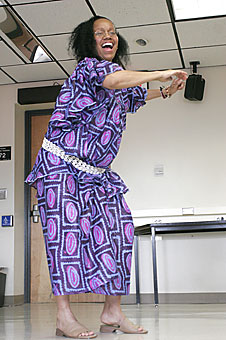 |
|
AURORA HIGGINSON/Arizona Daily Wildcat
|
African dance instructor Barbea Williams demonstrates the beauty of African dance to UA students in the Chavez building yesterday afternoon.
|
|
|
By Djamila Noelle Grossman
Arizona Daily Wildcat
Thursday, February 17, 2005
Print this
The 51-year-old dancer knew more about hip-hop than the students in the audience. She also knew how to dance to African music and be extremely cool.
Barbea Williams, a dance teacher at the UA and at the Tucson Dance Theater, held a lecture on African dance in the César E. Chávez building yesterday and spiced up her talk with dance performances to African music and American rap.
Williams said she grew up with music, doing "cha cha cha" and other dances with her family and taking ballet classes. She said that even though dancing has always been a part of her life, it took her many years to appreciate it.
"If I'd had a fun teacher like myself, I would have loved it," Williams said before she started to clap her hands and dance a little.
Before she decided to commit herself to dancing, she was an accounting major at the UA, which is to blame on her parents, Williams said. Three years ago, she started teaching dance classes at the UA.
Williams talked about "the new generation, who call themselves dancers," referring to the popular female dance styles to black music and rap.
The African dance style got reduced to the sex aspect of it, sitting on each other's laps and rubbing up against each other is "just this coochie, coochie," she said.
"I know professional people who work like that and I respect them - but it's not dance," Williams said.
Those dances are intimate and only tasteful if people actually know each other, Williams said.
She said young people especially pick up the contents of rap music and take it very seriously. When teaching an arts class in middle school, the students want to hear 50 Cent and P. Diddy, Williams said.
"It's those sexual things that happen with the music that we hear," she said. The children's language becomes "deep rooted sexual and violent."
Williams also talked about the Ibo, an ethnic group in Africa who committed suicide when threatened with slavery.
"They were such proud people that they killed themselves and their children. They didn't belong to nobody but themselves," Williams said.
Julian Kunnie, professor and director of African-American Studies, who introduced Williams in the beginning of the lecture, said many African people recalled their roots and ancestors when facing oppression.
"The dance was not mere entertainment. It was out of resistance, out of segregation, that people danced," Kunnie said.
Eno Washington, who was originally scheduled for this lecture, called in sick and was substituted by Williams.
